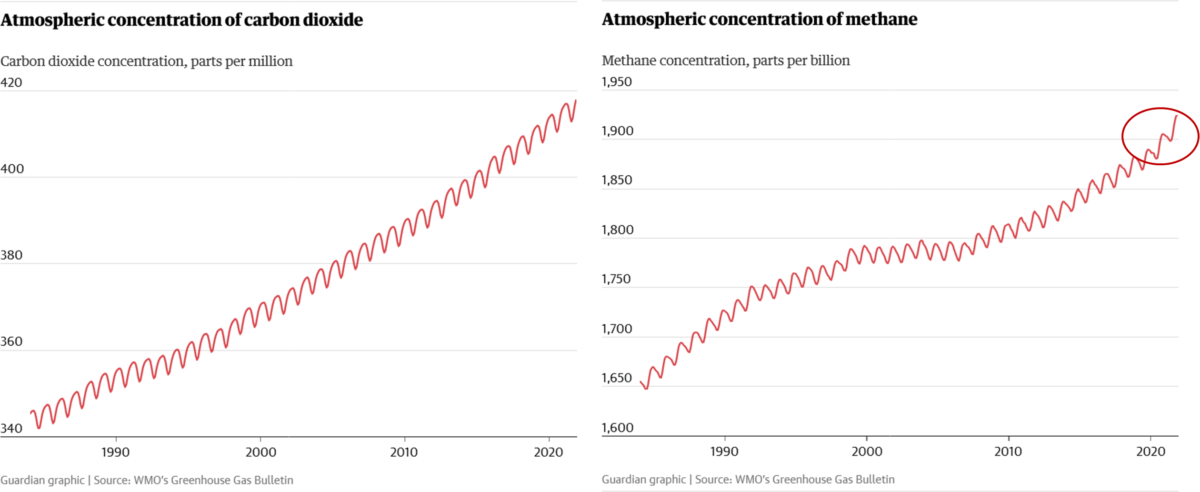We’re almost out of time to save our species!

The Guardian article shows we’re perilously close to the point of no return where global warming will be unstoppable. The UN says act now! Victoria needs to have a successful climate election as this is the only issue that really matters.
The featured image (from the Guardian article) shows no hint that the rising greenhouse gas emissions driving global warming have even slowed, let alone begun to reverse. In fact, as evidenced over the last three years (shown in the circle) methane emissions are currently accelerating. Over 100 years methane has more than 30 times the greenhouse potential than CO₂ (more than 80 X over 20 years!). Accelerating methane release from soils and permafrost is a highly dangerous source of temperature related positive feedback capable of driving temperatures higher than humans can possibly stop – to produce ‘runaway’ feedbacks forcing Earth’s climates into the ‘Hothouse Earth‘ state within a century or so that would most probably cause human extinction.
We face a real and existentially stark climate emergency. For humanity to have a future, WE MUST STOP AND REVERSE GLOBAL WARMING. Because this is a global phenomenon to have any hope of success, governments must coordinate and lead actions.

by Damian Carrington, 28/10/2022 in the Guardian
World close to ‘irreversible’ climate breakdown, warn major studies
Key UN reports published in last two days warn urgent and collective action needed – as oil firms report astronomical profits
The climate crisis has reached a “really bleak moment”, one of the world’s leading climate scientists has said, after a slew of major reports laid bare how close the planet is to catastrophe.
Collective action is needed by the world’s nations more now than at any point since the second world war to avoid climate tipping points, Prof Johan Rockström said, but geopolitical tensions are at a high.
He said the world was coming “very, very close to irreversible changes … time is really running out very, very fast”.
…
All three of the key UN agencies have produced damning reports in the last two days. The UN environment agency’s report found there was “no credible pathway to 1.5C in place” and that “woefully inadequate” progress on cutting carbon emissions means the only way to limit the worst impacts of the climate crisis is a “rapid transformation of societies”.
Read the complete article….
However, as dire as the UN’s predictions are, they almost certainly understate the magnitude of the risks. Government action is essential and urgently needed! Where Victoria is concerned we can elect such a government in less than three weeks.
In Australia, state governments probably have the most power to control and stop human sourced greenhouse gas emissions (CO₂ and methane) through licensing, permitting, and regulating (environmental and development). Even though the Andrews Labor Government in Victoria is doing a lot to act on the climate emergency, the voting record and its campaigning shows that Labor continues to support fossil fuel developments that will continue adding yet more greenhouse gases to the atmosphere. This will keep pushing us ever closer to the point of no return beyond which warming will run away to a Hothouse Earth and likely human extinction. This is a very real climate emergency!
Thus, the upcoming State Election gives Victorian voters a chance to shift our government towards prioritizing action on climate change. What we need to do is to elect enough climate friendly independent, minor party and Green representatives in present Labor seats to put climate activists into the balance of power. As demonstrated federally, fossil fuel puppets and other losers will undoubtedly shout to the rafters that a hung parliament is a recipe for chaos and disaster, but recall that in terms of passing legislation the Gillard Minority Government was arguably one of the most successful governments in Australian history.
Vote Climate One shows Victorians how you can use your preferential voting system to maximize the power of your vote to elect a climate friendly representative.
Our Climate Lens Traffic Light Assessment process has determined where every candidate in every electorate stands on climate issues and ranks them in one of three classes: Green Light – trustworthy supporter of a strong climate policy; Red Light – bad climate policy, voting record or other history suggests can’t be trusted to support a good strong climate policy, or position on climate cannot be determined; Orange Light – weak climate policy and/or record but definitely better than those ranked Red Light.
For the Victorian Election, our Voting Guides for each electorate do not tell you who to vote for. However, if you want to elect a climate friendly government, we provide information about every candidate’s climate policies and an easy to follow voting strategy to maximize the chance to elect a person with a good policy.
